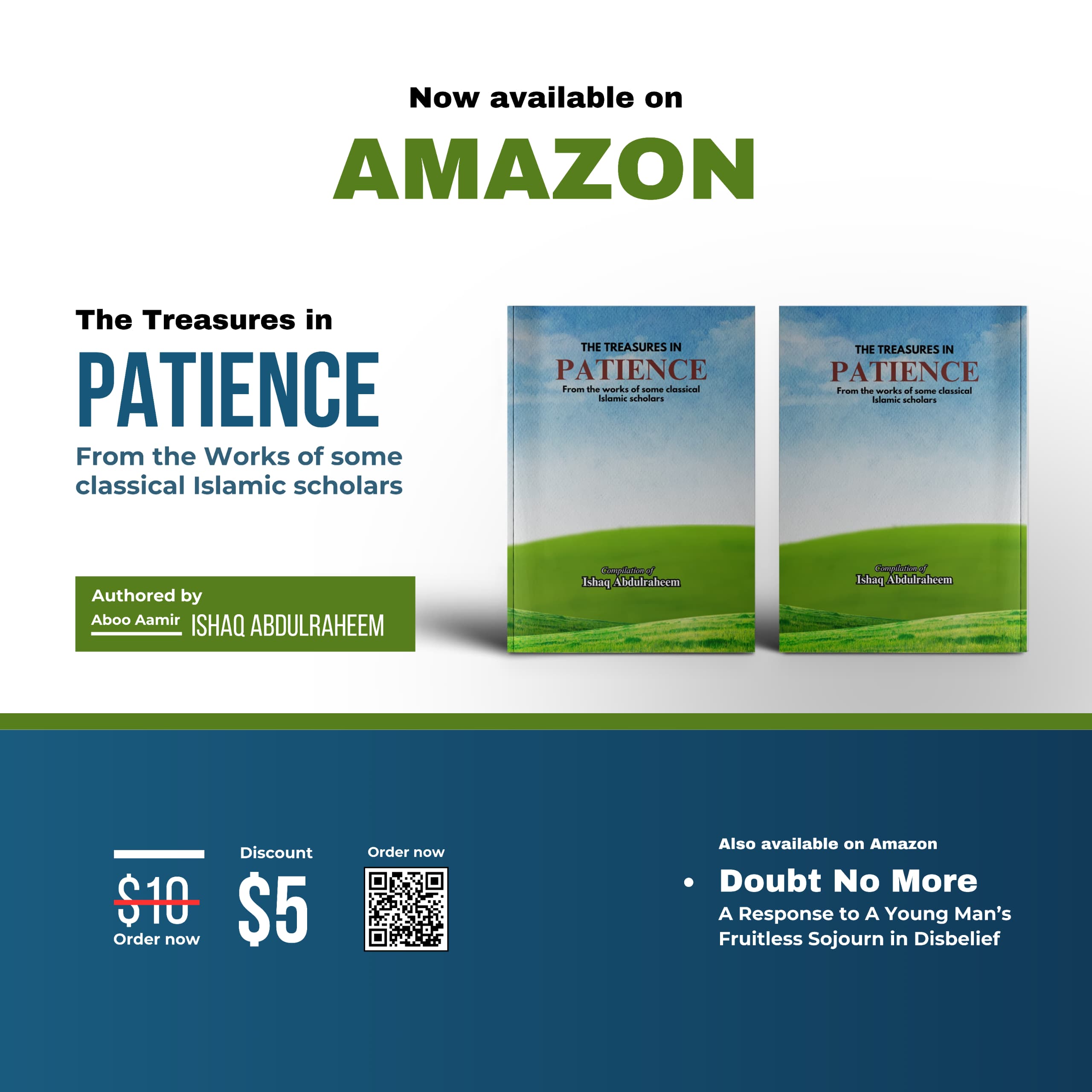Adaptation and Translation by Abul Aamaal Misbaah Olagunju (@Bn_Uthman)
Bismillaah-ir-Rahmaan-ir-Raheem
Explanation of the Perfect Names and the Lofty Attributes
[25] AL-WALIY
Allah the exalted said:
فَاللَّهُ هُوَ الْوَلِيُّ وَهُوَ يُحْيِي الْمَوْتَىٰ وَهُوَ عَلَىٰ كُلِّ شَيْءٍ قَدِيرٌ
"By Allah, He Alone is Al-Waliy (the Protector, the Supporter). And it is He Who gives life to the dead, and He is Able to do all things." - Surah Ash-Shura: 9
Al-Waliy
He is the one in charge of the affairs of His creation and the administration of His dominion, and He is the helper and supporter of His obedient slaves.
Points from the Exemplary Principles:
Bin Al-Uthaymeen said in Qawā'id al-Muthlā:
Principles regarding the attributes of Allah: The fourth principle:
As for the attributes of negation (salbiyyah), they only occur in three instances:
(1) In expressing His (Allah's) perfection, as it occurred in His statements:
لَيْسَ كَمِثْلِهِ شَيْءٌ
"There is nothing likened unto Him", (Ash-Shura:11) and
وَلَمْ يَكُنْ لَهُ كُفُوًا أَحَدٌ
"And there is none co-equal or comparable unto Him." (Al-Ikhlas:4)
(2) In negating the false claims of the liars against Him, as it occurred in His statements:
أَنْ دَعَوْا لِلرَّحْمَٰنِ وَلَدًا*وَمَا يَنْبَغِي لِلرَّحْمَٰنِ أَنْ يَتَّخِذَ وَلَدًا
"That they ascribe children to the Most Beneficent (Allah) * But it is not suitable for (the Majesty of) the Most Beneficent that He should beget a child". (Mar'yam:92)
(3) In repelling a defective assumption away from His perfection in relation to a specific affair, as it occurred in His statements:
وَمَا خَلَقْنَا السَّمَاوَاتِ وَالْأَرْضَ وَمَا بَيْنَهُمَا لَاعِبِينَ
"And We created not the heavens and the earth, and all that is between them, for mere play," (Ad-Dukhan:38) and
وَلَقَدْ خَلَقْنَا السَّمَاوَاتِ وَالْأَرْضَ وَمَا بَيْنَهُمَا فِي سِتَّةِ أَيَّامٍ وَمَا مَسَّنَا مِنْ لُغُوبٍ
"And indeed We created the heavens and the earth and all between them in six Days and nothing of fatigue touched Us." (Qaf:38)
[26] AL-HAMĪD
Allah the exalted said:
وَإِنَّ اللَّهَ لَهُوَ الْغَنِيُّ الْحَمِيدُ
"And verily, Allah He is Al-Ghaniy (Self-Sufficient) Al-Hamīd (All-Praiseworthy)" - Surah Al-Hajj: 64
Al-Hamīd
He is the one glorified over His names, attributes and actions, He is also glorified in happiness and during adversity, and in hardship and ease, He is the most deserving of adorations and extollment in their entirety.
Points from the Exemplary Principles:
Bin Al-Uthaymeen said in Qawā'id al-Muthlā:
Principles regarding the attributes of Allah: The fifth principle: Allah's affirmed attributes (Sifātu Thubūtiyyah) are of two categories: Sifātu Dhātiyyah (Attributes which are related to His essense) and Sifātu Faeliyyah (attributes related to His actions).
Sifātu Dhātiyyah: are those attributes which He never ceases from being described with (they are permanently and always with him), like knowledge, power, hearing, sight, honour, wisdom, loftiness and greatness, and from them are the attributes which we were only informed about through reports, like His face, two hands and two eyes - sifātu khabariyyah.
Sifātu Faeliyyah: are those attributes which are connected to His will, if He desire, He performs them, if He likes He doesn't, like His ascension over His throne and His descent to the lowest heaven.
[27] AL-MAWLĀ
Allah the exalted said:
وَإِنْ تَوَلَّوْا فَاعْلَمُوا أَنَّ اللَّهَ مَوْلَاكُمْ ۚ نِعْمَ الْمَوْلَىٰ وَنِعْمَ النَّصِيرُ
"And if they turn away, then know that Allah is your Mawlā (Patron, Lord, Protector and Supporter), (what) an Excellent Mawla, and (what) an Excellent Helper!" - Surah Al-Anfāl: 40
Al-Mawlā
He is the Lord, the Sovereign God, the Master, the Patron and the Helper to His righteous slaves.
Points from the Exemplary Principles:
Bin Al-Uthaymeen said in Qawā'id al-Muthlā:
Principles regarding the attributes of Allah: The fifth principle: Allah's affirmed attributes (Sifātu Thubūtiyyah) are divided into two: Sifātu Dhātiyyah (Attributes which are related to His essense) and Sifātu Faeliyyah (attributes related to His actions).
Sifātu Dhātiyyah becomes Sifātu Faeliyyah in two considerations, like in the case of His Speech, considering it's origin, it is an attribute related to His essence (dhātiyyah); because Allah never ceases to speak, and also when each speech is considered singularly, it is an attribute related to His action (faeliyyah); because speech is connected to His will, He speaks whenever He wishes with whatever/whoever He likes, as evidenced in His statement:
إِنَّمَا أَمْرُهُ إِذَا أَرَادَ شَيْئًا أَنْ يَقُولَ لَهُ كُنْ فَيَكُونُ
"Verily, His Command, when He intends a thing, is only that He says to it, "Be!" and it is!" (Ya-Seen:82).
And all the attributes that are connected to His will —the exalted— are all subsidiary to His wisdom. And His wisdom is something known to us though we are incapable of it's cognition, however, we know with certainty that Verily He –may He be glorified–, does not will a thing except that it in accordance with His wisdom, as was indicated in His statement:
وَمَا تَشَاءُونَ إِلَّا أَنْ يَشَاءَ اللَّهُ ۚ إِنَّ اللَّهَ كَانَ عَلِيمًا حَكِيمًا
"And you cannot will, unless Allah wills. Verily, Allah is Ever All-Knowing, All-Wise." - (Al-Insan: 30)
Adapted and Translated from:
Aahkaamu Tahamul Muslim
Sharhu Qawaa'idul Muthlaa'
In the past edition:

